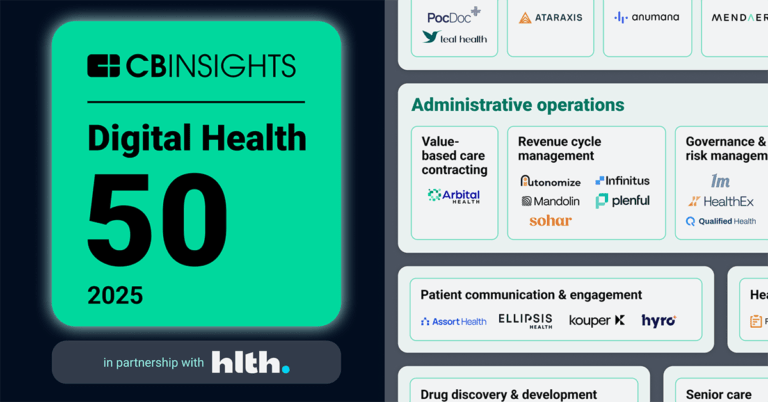
Ataraxis
Founded Year
2023Stage
Series A | AliveTotal Raised
$24.4MLast Raised
$20.4M | 1 yr agoMosaic Score The Mosaic Score is an algorithm that measures the overall financial health and market potential of private companies.
+390 points in the past 30 days
About Ataraxis
Ataraxis serves as a technology company focused on precision medicine within the healthcare sector, particularly in oncology. The company develops AI-native diagnostics that analyze multi-modal patient data for cancer treatment selection. Ataraxis serves the healthcare industry, with a focus on creating treatment plans based on AI analysis. It was founded in 2023 and is based in New York, New York.
Loading...
Ataraxis's Products & Differentiators
Ataraxis Breast
Ataraxis Breast is the first clinically validated AI-native prognostic/predictive platform for invasive breast cancer. It uses multi-modal patient data, including pathology slides and clinical information, to predict patient outcomes and help personalize treatment decisions.
Loading...
Research containing Ataraxis
Get data-driven expert analysis from the CB Insights Intelligence Unit.
CB Insights Intelligence Analysts have mentioned Ataraxis in 1 CB Insights research brief, most recently on Oct 20, 2025.

Oct 20, 2025 report
Digital Health 50: The most promising digital health startups of 2025Expert Collections containing Ataraxis
Expert Collections are analyst-curated lists that highlight the companies you need to know in the most important technology spaces.
Ataraxis is included in 4 Expert Collections, including Artificial Intelligence (AI).
Artificial Intelligence (AI)
20,894 items
Digital Health
12,122 items
The digital health collection includes vendors developing software, platforms, sensor & robotic hardware, health data infrastructure, and tech-enabled services in healthcare. The list excludes pureplay pharma/biopharma, sequencing instruments, gene editing, and assistive tech.
Oncology Tech
571 items
This collection includes companies applying technology to cancer care, diagnosis, and treatment. Examples include vendors offering cancer detection and diagnosis, oncology clinical decision support, real-world data, and AI oncology drug discovery.
Digital Health 50
50 items
Latest Ataraxis News
Oct 24, 2025
United States Precision Medicine Market is expected to reach US$ 62.82 billion by 2033 from US$ 26.58 billion in 2024, with a CAGR of 10.03% from 2025 to 2033 Government support for personal medicine, the rise in chronic diseases, the adoption of AI and machine learning technologies, the development of genomics technology, the expansion of healthcare data, and regional partnerships between tech companies and healthcare institutions are the main factors propelling the market. The U.S. precision medicine market demonstrates strong regional growth, with California, Texas, New York, and Florida emerging as key hubs due to advanced research institutions, healthcare infrastructure, government initiatives, and expanding industry collaborations. The high incidence of chronic illnesses in the US is the main factor propelling the market. such as cardiovascular diseases and cancer. For example, the U.S. Food & Drug Administration found that common chronic diseases (CCDs) account for seven of the top 10 causes of mortality in the United States, with diet-related conditions like obesity, diabetes, cardiovascular disease, and several types of cancer playing a major role. The demand for a special therapeutic intervention is being fueled by the fact that 28 million Americans still smoke and yet the United States has diet-related disease rates that are lower than those of 42 other countries. The market is expanding as a result of ongoing technological advancements in genetics and bioinformatics that enhance the design of personalized medicines. In addition, rising investments by pharmaceutical companies into precision medicine research and development operations are adding momentum to the precision medicine market in the United States. The solutions are also becoming more widely available thanks to government initiatives that foster creative healthcare solutions and finance precision medicine initiatives, which encourage wider market adoption across healthcare systems. Additionally, more precise patient profiling and treatment customization are being encouraged by the growing integration of AI and big data analytics in healthcare, which is fueling market expansion. An important element driving market expansion is the growing availability of direct-to-consumer genetic testing services, which are raising patient awareness and involvement. In addition, research centers and healthcare service providers are forming strategic collaborations that accelerate the conversion of research findings into clinical practice, so promoting growth. To enhance pandemic readiness, for example, Care Access announced on August 26, 2024, a multimillion-dollar partnership with the Biomedical Advanced Research and Development Authority (BARDA) of the U.S. Department of Health and Human Services. Through the cooperation, Care Access's decentralized clinical trial network will expand to include up to 150 community-based clinicians from 30 regions, community groups in underserved areas, and long-term care providers nationally. The program guarantees equitable healthcare for all varied communities and attempts to increase access to immunizations and treatments during public health emergencies. The demand for precision medicine solutions is rising as a result of growing interest in reducing adverse drug responses and enhancing treatment efficacy, which further supports the market forecast in the US. Key Factors Driving the United States Precision Medicine Market Growth Developments in Biomarker Identification and Genomic Sequencing Because it allows physicians to decipher patient-specific genetic profiles and create highly customized treatment plans, genomic sequencing has emerged as the foundation of precision medicine. Next-generation sequencing (NGS) technologies have advanced quickly, improving the speed, accuracy, and cost-effectiveness of genomic analysis while boosting accessibility across healthcare systems. By finding genetic mutations, protein expressions, or metabolic markers that inform treatment choices, biomarker discovery further improves diagnostic precision. Biomarkers are essential in oncology because they help determine medication response and tumor behavior, which enhances treatment results and minimizes side effects. Additionally, by enabling medication developers to target certain patient populations instead of depending on broad-spectrum medicines, these improvements speed up pharmaceutical R&D. Genomic sequencing and biomarker discovery will continue to be a key growth driver as costs continue to drop and technology advance, encouraging the broad use of individualized care across the US. Combining Big Data Analytics and Artificial Intelligence By facilitating the real-time processing of complicated patient data, the emergence of artificial intelligence (AI) and big data analytics is substantially propelling the precision medicine market in the United States. Massive datasets, such as genetic profiles, medical imaging, and electronic health records, can be analyzed by AI-powered algorithms to produce insights that physicians can use. Predictive models aid in early illness risk assessment, treatment plan customization, and efficient resource distribution within healthcare systems. AI also speeds up drug research by more accurately identifying possible treatment candidates and simulating molecular interactions. By identifying illness trends and treatment efficacy on a broader scale, big data analytics improves population health management. When combined, these tools reduce trial-and-error methods and promote more precise clinical decision-making. One of the key elements propelling expansion in the precision medicine market in the United States is the combination of AI and data-driven technologies, which not only enhances patient outcomes but also lowers healthcare expenses. Increasing Government Assistance and Funding for Research The advancement of precision medicine in the US is greatly aided by government funding and initiative programs. The nation's dedication to creating individualized care solutions was demonstrated by the federal government's establishment of the Precision Medicine Initiative (PMI). Large-scale research initiatives like the "All of Us" initiative, which attempts to gather genetic, lifestyle, and environmental data from varied populations, have received significant funding from federal institutions like the National Institutes of Health (NIH). These programs are encouraging creativity, advancing public-private partnerships, and guaranteeing that the advantages of precision medicine are distributed throughout communities. Additionally, biotechnology and pharmaceutical companies are being encouraged to hasten the development of targeted medicines and diagnostics by supportive policies and favorable regulatory processes. Government funding keeps the precision medicine ecosystem strong by emphasizing innovation, data infrastructure, and inclusivity, guaranteeing that the US stays at the forefront of this changing healthcare paradigm. Challenges in the United States Precision Medicine Market High Costs and Limited Accessibility The high expense of advanced diagnostics, individualized treatments, and genomic testing is one of the main obstacles facing the U.S. precision medicine sector and may prevent some patients from accessing these treatments. Even though sequencing costs have decreased dramatically in recent years, underinsured people and those living in rural or underserved areas frequently cannot afford thorough tests and individualized therapies. Inconsistent insurance coverage for precision medical services leads to differences in adoption among various socioeconomic groups. Large-scale adoption is hampered by this pricing gap since precision medicine runs the risk of becoming exclusive to affluent groups. Achieving equal access is still difficult in the absence of efficient cost-cutting measures and expanded insurance coverage, which could impede the rate of broad integration into mainstream healthcare systems across the US. Issues with Data Security, Privacy, and Interoperability The gathering and examination of private patient data, such as genetic information, lifestyle choices, and medical records, is essential to precision medicine. Critical questions concerning data security, privacy, and interoperability across healthcare systems are brought up by this dependence. Given the increasing frequency of cyberattacks on healthcare infrastructure, safeguarding patient data against breaches and illegal usage is a major concern. Furthermore, the absence of uniform data-sharing guidelines among medical facilities, academic institutions, and technology suppliers leads to inefficiencies and impedes cooperation. Concerns over the storage and use of their genetic data may potentially make patients reluctant to engage in precision medicine initiatives. Gaining patient trust and facilitating widespread adoption require ensuring secure data management, creating interoperable systems, and upholding transparency. Despite technological developments, the market's potential for growth may be limited if these issues are not resolved. Key Attributes: Recent Developments in U.S. Precision Medicine Market A significant breakthrough in precision medicine was made on October 31, 2024, when Ataraxis AI introduced Ataraxis Breast, the first AI-native prognostic and predictive test for breast cancer. In a groundbreaking study, the test was clinically validated and showed a 30% increase in accuracy compared to the current standard of care. To further its development, the company also obtained USD 4 million in seed funding, which was co-led by Giant Ventures and Obvious Ventures. Patient enrollment for myeloMATCH was launched on October 23, 2024 by four leading cancer research organizations: SWOG Cancer Research Network, ECOG-ACRIN Cancer Research Group, Canadian Cancer Trials Group, and the Alliance for Clinical Trials in Oncology. The National Cancer Institute's National Clinical Trials Network oversees this portfolio of precision medicine clinical trials that focus on myelodysplastic syndrome (MDS) and acute myeloid leukemia (AML). With biomarker-driven treatment options available throughout their care, the program hopes to enroll more than 5,000 patients in the United States and Canada. Company Analysis: Overview, Key Persons, Recent Developments, SWOT Analysis, Revenue Analysis AstraZeneca plc
Ataraxis Frequently Asked Questions (FAQ)
When was Ataraxis founded?
Ataraxis was founded in 2023.
Where is Ataraxis's headquarters?
Ataraxis's headquarters is located at 169 Madison Avenue, New York.
What is Ataraxis's latest funding round?
Ataraxis's latest funding round is Series A.
How much did Ataraxis raise?
Ataraxis raised a total of $24.4M.
Who are the investors of Ataraxis?
Investors of Ataraxis include Giant Ventures, Obvious Ventures, Thiel Bio, Ryan Fukushima, Mario Schlosser and 11 more.
Who are Ataraxis's competitors?
Competitors of Ataraxis include SimBioSys and 4 more.
What products does Ataraxis offer?
Ataraxis's products include Ataraxis Breast.
Loading...
Compare Ataraxis to Competitors

Stratipath specializes in AI-based precision diagnostics within the healthcare sector, focusing on cancer treatment decision support. The company offers cloud-based SaaS solutions that leverage deep learning technologies to provide risk profiling of tumors, particularly for breast cancer. Stratipath's services are utilized by healthcare providers, including oncology clinics and pathology labs, to enhance the diagnostic process. It is based in Sweden.

Merative operates as a technology and analytics partner for the health and social care sectors, focusing on healthcare data. The company offers services including clinical decision support, clinical development, medical imaging solutions, healthcare analytics, and health and human services. Merative serves healthcare providers, health plans, life sciences companies, employers, and government agencies. Merative was formerly known as IBM Watson Health. It was founded in 2022 and is based in Ann Arbor, Michigan.

Turbine specializes in oncology drug discovery through its cell simulation platform within the biopharmaceutical sector. The company offers services such as target selection, Antibody-drug conjugates (ADC) payload matching, clinical positioning, and Demand-Driven Research Initiative (DDRi)-related services, focused on improving drug discovery and development. Turbine's platform provides data science insights to identify and validate novel targets and treatments. It was founded in 2016 and is based in Budapest, Hungary.

Agendia is a precision oncology company specializing in genomic profiling for early stage breast cancer. The company offers two main genomic tests, MammaPrint and BluePrint, which provide information to assist in identifying treatment options for breast cancer patients. These tests aim to help in pre- and post-operative treatment decisions by assessing the risk of cancer recurrence and the biology of the tumor. It was founded in 2003 and is based in Irvine, California.
Digistain specializes in breast cancer biomarker analytics within the healthcare technology sector. The company provides a solution that transforms traditional biomarker analysis into a quicker and more affordable process, offering clinicians information for breast cancer recurrence risk profiling. Digistain's technology serves the healthcare sector, integrating with existing clinical workflows to assist in decision-making in cancer treatment. It was founded in 2020 and is based in London, England.
Qualisure Diagnostics Inc. specializes in molecular diagnostics within the healthcare sector, focusing on cancer care. The company develops tests that aim to improve diagnostic accuracy and facilitate tailored cancer treatments. Qualisure's products are designed to support oncologists in treatment decision-making and to contribute to precision medicine initiatives. It was founded in 2017 and is based in Calgary, Alberta.
Loading...
